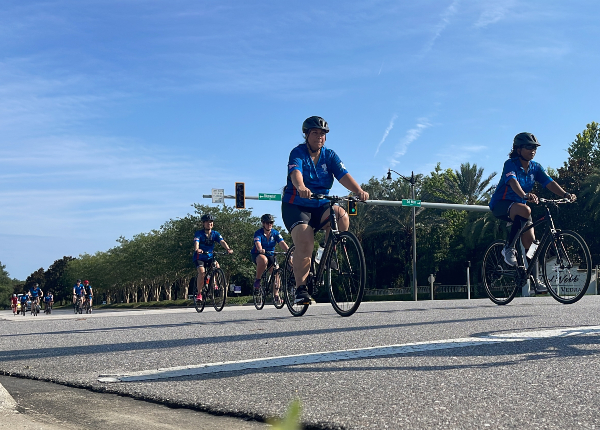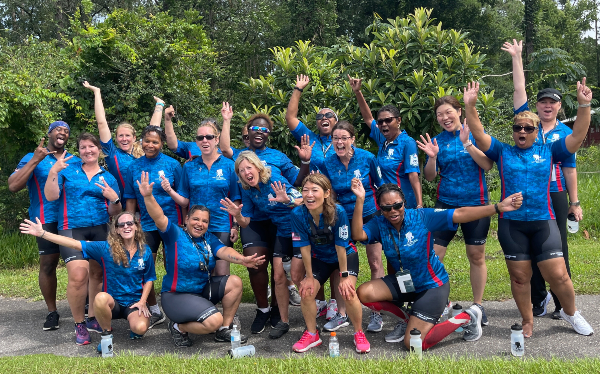Military Caregivers Pedal Their Way to Bonding and Self-Care with WWP’s Soldier Ride and Independence Program

Wounded Warrior Project’s Soldier Ride® has served nearly 16,000 injured warriors and family members since 2004. The event’s spirit of inclusion means no one is left behind.
Cyclists ride together as a bonded group and help each other along the way. Each person’s level of ability is met with encouragement and solidarity. Warriors move together as a unit, just like they once did in the military.
The Independence Program helps severely injured and ill veterans reach goals on their path to living more fulfilling lives. It also provides support to their caregivers.
The interconnectedness of WWP’s programs is intentional. They are created to surround warriors, family members, and caregivers with care and support. Because of this, the Soldier Ride and Independence Program teams have found natural ways to collaborate over the years.
Soldier Ride events have included injured warriors and caregivers from the Independence Program, enabling them to experience the camaraderie of riding together with other military families.
In 2023, 20 caregivers from the Independence Program took center stage in a special Soldier Ride in Jacksonville, Florida – because caregivers are heroes, too. Through this event, caregivers took time for themselves and learned new ways to stay physically active and network with other caregivers.
“Veteran caregivers have a 24-7, 365-day-a-year job, and it is somewhat thankless and certainly selfless,” said Bill Hayes, Soldier Ride manager at WWP.
“In our eyes, caregivers also need a rest, and they need some time to get their mind right. While we honor and empower warriors, we also would like to honor and empower caregivers and give them some respite.”
The caregivers rode 20 miles a day during the two-day event. They also had a chance to go paddleboarding together, and bond with other caregivers.

For many of them, the companionship of other military caregivers brings camaraderie, relaxation, and hope. As they come together, they develop friendships and compare notes on how to make caregiving easier.
“The social connection and engagement amongst the group is so powerful, it lifts their spirits,” Bill said. “They go home and continue to serve their loved one with more love and support.”
Filling Your Cup
For Jeannette Ezell, caregiver to her husband Dwayne, just being around other caregivers is a game-changer.
“It has been wonderful,” Jeannette said. “Being able to talk to one another, and laugh together, and know that no one was left behind no matter what our skill level on the bike. I appreciated just looking out for one another. These are life-long friendships that I’ve made.”
Jeannette became a full-time caregiver for Dwayne when he developed multiple sclerosis and dementia after 20 years in the Air Force. She appreciated the companionship as much as the ride itself: “I loved getting out in the world and being able to be out there with other caregivers.”
Anna Han’s husband, Samuel, is an Army veteran who sustained a moderate traumatic brain injury (TBI) from a blast while deployed to Iraq. Samuel needs constant care and prompting and has migraines and memory issues. Samuel and Anna also have two daughters.
“It’s super important to fill your cup before you can pour out from your cup,” Anna said. “I always feel that if you don’t take care of yourself, you can’t care for others, so I really enjoyed this experience.”
Anna said she was initially apprehensive about riding a bike for a long period of time, but the encouragement from other caregivers and WWP staff gave her the confidence to go 40-plus miles.
“Even though we’re in different stages of our lives, what we have in common is caring for our warriors and knowing that is special, as well as being able to share each other’s accomplishments,” Anna added.
Learning to Recharge Your Batteries
When caregivers come together, they reconnect with their own wishes and aspirations and find a life-long support network. Most importantly, they see that it’s OK to take time for themselves.
“It can seem like a chore to take time for yourself when you’re a caregiver,” said Jennifer Jenkins, WWP staff member, and caregiver for her Army veteran brother. “The truth is the caregiving lifestyle can be isolating. If we have a spare hour, oftentimes, we’ll use it to take care of our loved ones or to take care of the house. We rarely use extra time to take care of ourselves – we don’t know how.”
Jennifer became a caregiver for her brother James in 2005, when he suffered multiple injuries while deployed to Iraq. James endured partial hearing and vision loss, traumatic brain injury (TBI), and post-traumatic stress disorder (PTSD).
Jennifer highlighted the importance of “recharging your batteries.”
“Events like these are really important because you can learn from other caregivers, you can learn from Wounded Warrior Project staff who are here to help, and you can use that extra hour that you might be able to find in your day to take care of yourself.”
WWP staff continue to see the benefits of bringing military caregivers together.
“In the Independence Program, we are focused not only on serving warriors but also their caregivers. There is a sense of understanding and community among caregivers,” said Kelly Parker, deputy director of the Independence Program at WWP.
“We know that oftentimes, caregivers put their own needs on the back burner and don’t take enough time for respite and self-care. You must put on your own oxygen mask first before you can help others. We hope to provide this respite opportunity to help our caregivers recharge and build a support network of other caregivers.
“We are also hoping that caregivers see that bike riding can be a form of respite and self-care. It is important to get outside, move your body and take care of yourself.”
WWP helps warriors heal from visible and invisible injuries. It also supports veteran families who care for injured post-9/11 veterans regardless of where an injury occurred or when an illness started.
Get connected today or read more about how WWP helps.
Contact: Raquel Rivas – Public Relations, rrivas@woundedwarriorproject.org, 904.426.9783
About Wounded Warrior Project
Since 2003, Wounded Warrior Project® (WWP) has been meeting the growing needs of warriors, their families, and caregivers — helping them achieve their highest ambition. Learn more.